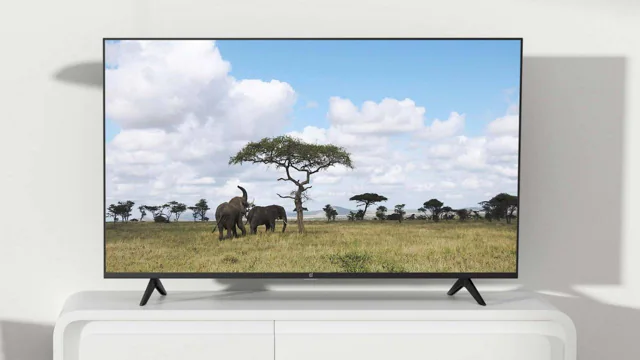Ameya DalviAug 29, 2022 16:54:45 IST
Pros:
– Good picture quality in 4K content
– HDMI 2.1 ports with support for eARC
– Dual-band WiFi
– Access to picture and sound settings on the fly
– Android TV 10 with clean UI
– Affordable
Cons:
– No Dolby Vision support
– No analogue audio output
– No dedicated power button yet
– Erratic contrast at times
Overall Rating: 3.7/5
Price: Rs 32,999
The Y series TVs from OnePlus have been their most affordable, as they pack just the minimum necessary features and nothing fancy, which is pretty much what the potential buyers in the segment look for. When you add the Pro suffix, you do get a few extras, and in fact, the latest Y1S Pro series TVs find themselves a lot closer to the relatively more premium U series.
Going by the spec-sheet, the OnePlus TV 50 Y1S Pro that we have for review today feels a lot like the 50 U1S that we reviewed a few months ago, sans the far-field mics and Dynaudio sound for a significantly lower launch price. If that’s the case, it may translate into great value for money. Let’s find out how good this Y1S Pro TV truly is.
OnePlus TV 50 Y1S Pro – Design and connectivity: 8/10
Just like the U1S, this TV sports a near bezel-less design on three sides. The bottom bezel isn’t too thick either, and it’s all black here, unlike the grey outline in the U1S. The long trapezoid chin that hosted a bunch of LEDs and receivers for far-field mics has been replaced with a standard tiny one that holds the power LED and IR receiver. Though there is nothing wrong with Y1S Pro’s design, it feels like any other bezel-less TV and not as stylish as the U1S.
The TV can be wall-mounted or placed on a desk using the bundled plastic stands that don’t feel as sturdy as the metal ones, but hold the TV firmly in place. The necessary screws are present in the package. You get the usual OnePlus voice enabled remote along with a pair of AAA batteries to power it. The remote is compact but still doesn’t have a dedicated power button; more on that in a bit.
In the connectivity department, you have the key bases covered, barring one. You get three HDMI 2.1 ports, one of which supports eARC – something I am quite pleased to see in a budget TV. In addition to that, you have two USB 2.0 ports, Optical audio out, A/V input and a LAN port. An analogue audio output like a 3.5 mm headphone jack or a coaxial A/V out continues to be absent. Wireless connectivity options include Bluetooth 5.0 and dual band WiFi with support for 2.4 GHz and 5 GHz networks.

Image Credit: Tech2 | Ameya Dalvi
All ports are placed along the left edge of the rear module. And just like in case of the U1S, the ports are located closer to the centre of the TV rather than near the edge, making them hard to access, especially if you wall mount the TV. This is a common design flaw in most budget TVs.
OnePlus TV 50 Y1S Pro – Features and specifications: 8/10
As the model number suggests, the OnePlus TV 50 Y1S Pro has a 50-inch panel, and it flaunts an Ultra HD resolution of 3840 x 2160 pixels and a 60 Hz refresh rate. Information about the panel type and its peak brightness hasn’t been provided by OnePlus, but it looks like a VA panel. It supports HDR10/10+ and HLG formats for HDR content. It doesn’t support Dolby Vision, which I wasn’t expecting either, given that the more expensive U1S also isn’t compliant with it. It does offer 10-bit colour depth and can display over a billion shades.
This TV is powered by a 64-bit quad core processor with Cortex A55 cores and Mali G52 GPU. You get 2 GB RAM and 8 GB of internal storage (half of U1S), a sizable chunk of which is taken up by the Android TV 10 OS and the preinstalled apps. You are left with just half the space for installing more apps. Sound output is rated at 24 Watts RMS with support for Dolby Audio. Unfortunately, there is no involvement of Dynaudio here, who had done a pretty neat job with the audio tuning in some of OnePlus’ more premium models.
As with all Android TVs, it has Chromecast built-in and lets you cast content to the TV from compatible apps on your phone or tablet. The wireless remote control bundled with this TV operates over IR and Bluetooth both. After pairing it with the TV, you can bring up the Google Assistant by pressing the corresponding button and issue voice commands. You cannot go completely hands free here, as this TV excludes far-field mics to keep the cost down; a fair tradeoff.

Image Credit: Tech2 | Ameya Dalvi
As for the remote, the key layout is fine and most of the necessary buttons are present, barring one. The concave shape for the Back button is a nice touch so that one can use it without looking at the remote. Certain buttons are assigned multiple tasks again, and while that reduces the clutter, it also causes undesired actions at times. Case in point, the missing dedicated power button. You need to keep the key with the OnePlus logo pressed to restart or shut down the TV or put it to sleep. If you press it quickly out of habit or release it too soon, it launches OxygenPlay, leading to irritation.
OnePlus TV 50 Y1S Pro – User interface: 8/10
The OnePlus TV 50 Y1S Pro runs Android TV 10 OS with a stock user interface. Not much has changed here since the U1S. It is easy to get a hang of despite the newer Google TV-like UI. You have a row of installed apps, the shortcuts for which can be added, removed or shuffled around. Other rows display last played or suggested content from various OTT services. The UI is pretty much lag-free.
Once again, OnePlus has included apps for a bunch of streaming platforms on this TV. One can understand bundling apps for Prime Video, Netflix and Disney+ Hotstar given their hotkeys on the remote. But on top of that, you have apps for Zee5, Voot, Lionsgate Play, Sony LIV, Spotify and many more that take up a chunk of the internal storage. The good part being you can uninstall most of them to free up space.

OxygenPlay 2.0 is also present, which aggregates content from various streaming services. You need to have an active subscription for the given service to watch the respective content. The Y1S Pro lets you adjust sound and picture settings on the fly while viewing content from any source or app. While there is no dedicated settings button on the remote, long pressing the menu button for a couple of seconds brings up the quick settings menu from where you can access the necessary functions.
OnePlus TV 50 Y1S Pro – Picture quality: 7/10
The overall picture quality of this TV is a bit of a mixed bag. But before I get into the finer details, let me clarify upfront that the picture is perfectly fine for a budget TV, after making a handful of adjustments from the picture settings. The picture is tuned reasonably well out of the box as far as colour reproduction is concerned. But with motion compensation turned on by default, there are far too many motion artefacts visible on screen. I would strongly advise switching off MEMC as it never really does a great job on budget TVs. Same goes for all dynamic contrast and auto brightness settings.
Post that, the picture looks clean on this OnePlus TV. When it comes to SDR content, the brightness and contrast are good, and details in dark areas in high contrast scenes in our test videos were clearly visible. The colour reproduction is good too, but it is clearly a notch higher in HDR content. But the contrast tends to act funny in certain scenes. Not only was there noticeable flickering in certain areas of high contrast scenes, but at times the entire background lighting would change from dim to bright and vice versa. Think of it like someone switching an extra light bulb in the room on and off every 5 seconds.
I don’t think it’s a panel issue but more of a bug in the picture engine rendering certain scenes. This was mainly visible in HDR10/10+ content on Prime Video. When not facing this issue, the content on the same OTT service would also produce some great results with respect to colours, sharpness and detail. Even 1080p content on Prime Video and even Netflix looked great on this screen, and at times it seemed as good as 4K. In SDR content, the difference between those two resolutions was more distinct with 1080p videos not looking as lively as their HDR counterparts.
The black levels, though not spectacular, were pretty decent for a budget TV. As I mentioned earlier, the Y1S Pro is not Dolby Vision compliant, and shows encoded in that format play in HDR10/10+, and this TV does a fair job of rendering them. 720p videos are watchable, but the upscaling is not that great. Anything in lower resolution looks washed out, as is the case with most 4K TVs. The viewing angles were acceptable but with some noticeable colour shift from sharp angles.

OnePlus TV 50 Y1S Pro – Audio quality: 6.5/10
A pair of bottom firing speakers rated at 24 Watts RMS delivers standard quality audio. The output is loud and vocals centric for better dialogue clarity, but it lacks the punch and warmth that Dynaudio’s tuning offered on the U1S. I suspect that TV used a different set of drivers too. It is perfectly usable when watching news or sports or most dialogue centric programs. But music and action movies/ web series aren’t as enjoyable on the TV speakers due to the weak bass.

The audio is generally loud enough around 40 percent volume level, and seldom did I have to push it beyond 60% during the course of testing. If you seek better sound quality, you can always connect a soundbar or a speaker system, given the number of audio outputs available here like Bluetooth, optical and HDMI eARC. What’s more, you can also plug in a Dolby Atmos compliant soundbar into the TV’s HDMI eARC port to crunch the Atmos audio feed when available using passthrough option.
OnePlus TV 50 Y1S Pro – Overall performance: 7/10
The TV takes less than 40 seconds to boot up when you switch it on from the mains, which is average for Android TVs. Post that, the TV comes back on in just a couple of seconds from standby mode. Just like its more premium siblings, it takes much longer to get it into standby mode. As I mentioned earlier, this OnePlus TV too lacks a dedicated power button, and I touched upon its side-effects too. About time the company added this basic necessity.
Other than that, things work as expected. The voice assistant is fairly prompt to respond. Media playback through USB is quite good too through the default media player. If for some reason you don’t like it, you can always install a different one from the Google Play Store available on this TV.
OnePlus TV 50 Y1S Pro – Price and verdict
The OnePlus TV 50 Y1S Pro can be purchased for Rs 32,999 with a one year warranty on the company’s website as well as other popular ecommerce platforms. Barring some contrast issues and average sound output, it is a pretty good budget 4K TV with HDR10+ compliance, good connectivity options and newer HDMI 2.1 ports with support for eARC. But this is a competitive segment in India that’s heating up further, and there are more options for one to consider.
The Redmi X50 with similar specs, comparable picture quality, HDMI 2.1 ports, Android TV 10 is available at a similar price, and it supports Dolby Vision too. Hisense and Toshiba have recently launched their 50-inch 4K models with Dolby Vision and Android TV 11 for less than 35K, which we will review shortly. And lastly, the price of OnePlus 50 U1S has dropped to Rs 35,999 making it a very attractive proposition. For just Rs 3,000 more than the 50 Y1S Pro, you get a few modern features like far-field mics, superior picture quality and much better sound. So, why settle?
Source by www.firstpost.com





























